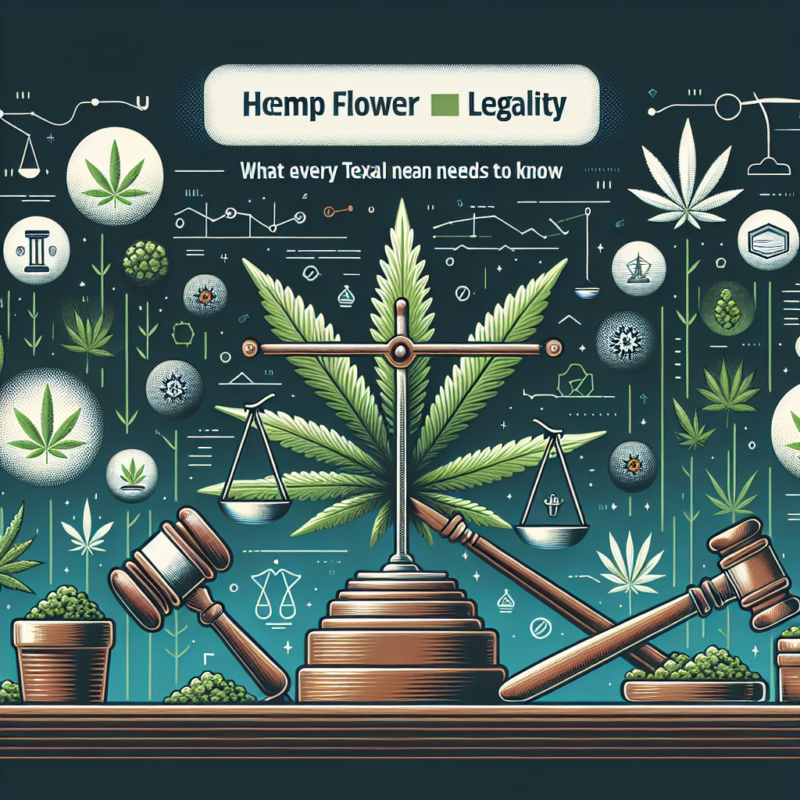Understanding Hemp Flower Legality: What Every Texan Needs to Know
As the hemp industry continues to flourish across the United States, Texas stands at the forefront of this burgeoning market. With its agricultural roots and vast landscapes, the state has become a focal point for hemp cultivation, particularly since the passage of the 2018 Farm Bill. However, the legality surrounding hemp flower can be confusing for consumers, farmers, and business owners alike. This article aims to clarify hemp flower legality in Texas and what that means for its residents.
What is Hemp?
Hemp is a variety of the Cannabis sativa plant, which is cultivated specifically for its industrial uses. Unlike marijuana, which contains high levels of tetrahydrocannabinol (THC), hemp contains less than 0.3% THC by dry weight. This minimal amount of THC is essential in distinguishing hemp from marijuana in the eyes of the law.
The Farm Bill of 2018
The legal landscape of hemp changed dramatically with the passage of the 2018 Farm Bill, which removed hemp and its derivatives from the Schedule I controlled substances list. As a result, hemp cultivation, processing, and sales became federally legal, provided that the hemp products comply with the THC threshold. This federal legislation gave states the authority to create their own regulatory systems for hemp production.
Texas Hemp Regulations
In Texas, hemp is regulated under the Texas Senate Bill अझ, which was passed in 2019. This bill allows farmers licensed by the Texas Department of Agriculture (TDA) to grow hemp and also established guidelines for the processing and sale of hemp products.
Licenses and Registration
To legally cultivate hemp in Texas, individuals must obtain a license from the TDA. Farmers must submit an application that includes details about their land and the hemp strain they intend to grow. The TDA also requires a background check to ensure compliance with state laws.
Testing and Compliance
One of the critical aspects of maintaining legality is adherence to THC limits. Hemp flowers must be tested regularly to ensure they do not exceed the 0.3% THC threshold. If a harvest is found to contain more than this permissible level, the crop must be destroyed. These regulations are in place to prevent any potential misuse of hemp that could lead to increased marijuana production.
Legal Status of Hemp Flower for Consumers
For Texans interested in purchasing hemp flower, it is important to know that while the cultivation and sale of hemp are legal, there are still regulations governing the retail environment. Hemp flower is legal for sale, but it must be labeled accurately and cannot be marketed as a treatment for any medical conditions unless it has been approved by the FDA.
Where to Buy
Hemp flower can be purchased from licensed dispensaries, online retailers, and local markets. However, consumers should verify that they are buying from reputable sources. Businesses selling hemp products must provide lab results confirming the products’ cannabinoid content to ensure compliance with state laws.
The Confusion Around CBD
Cannabidiol (CBD) products derived from hemp are widely available in Texas, adding to consumer confusion. While CBD is legal, the regulations governing it are still evolving. It is essential for consumers to recognize that not all CBD products are created equal, and the presence of uncontrolled or unlabelled THC levels could pose legal risks.
Future of Hemp Legality in Texas
As the hemp industry continues to grow, Texas is likely to see further developments in legislation and regulation. Advocates for hemp cultivation emphasize the potential economic benefits, including job creation and agricultural diversification. As the market matures, Texans should stay informed about any changes in laws governing hemp and its derivatives.
Conclusion
Understanding the legality of hemp flower in Texas is crucial for farmers, consumers, and businesses looking to navigate this evolving landscape. As the state embraces hemp cultivation and pops with new retail opportunities, awareness and compliance with the legal framework will help ensure a vibrant and responsible hemp industry. Texans looking to engage with hemp products should remain informed, purchase from reputable sources, and always verify compliance with state and federal regulations.

